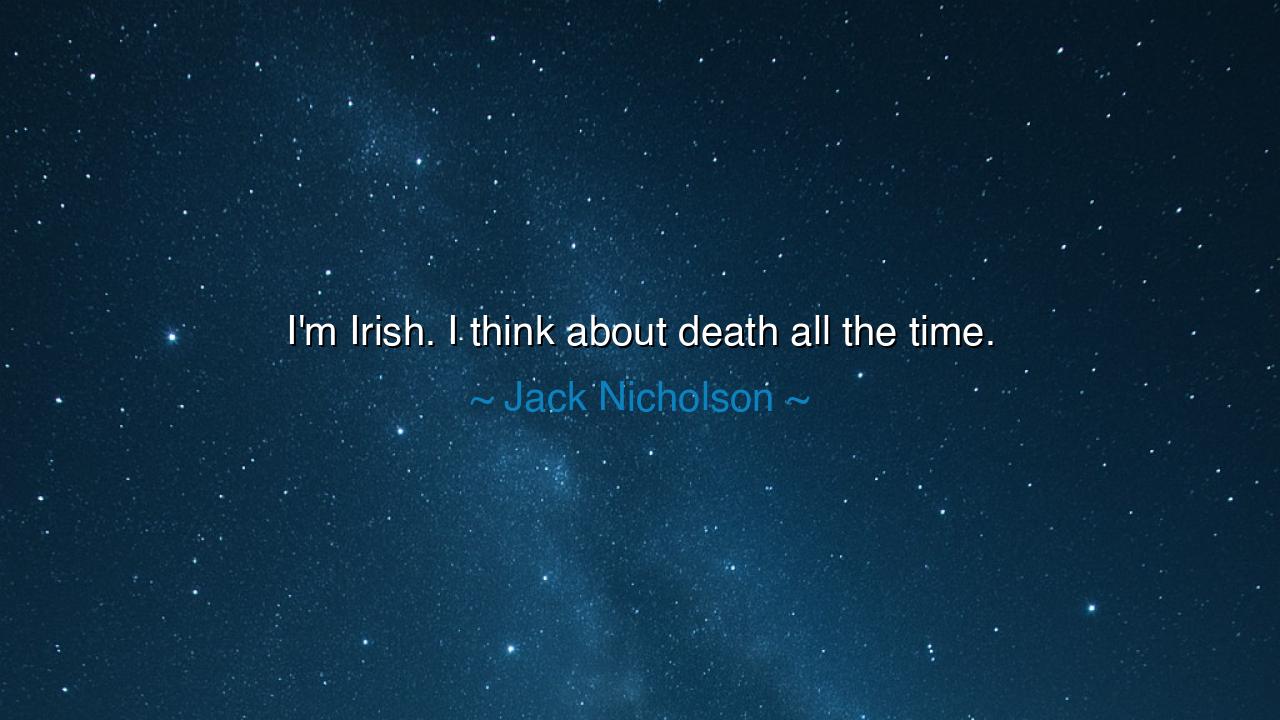
I'm Irish. I think about death all the time.






The words of Jack Nicholson — “I’m Irish. I think about death all the time.” — strike with a dark humor that conceals a deep and ancient truth. Though uttered with the wry smile of an artist known for his mischief, these words touch the core of a philosophy older than memory — the Irish relationship with mortality, which is neither cold nor hopeless, but strangely intimate, poetic, and wise. To “think about death all the time” is not, in this sense, an act of despair. It is an act of remembrance, a way of living fully while never forgetting that life is fleeting. For those born of Irish spirit, death is not an enemy to be denied, but a companion who walks beside us from birth — a silent teacher, reminding us to cherish the fragile beauty of the present moment.
To understand the roots of this saying, we must look into the soul of Irish culture, where laughter and sorrow are entwined like ivy around the same tree. The Irish people, shaped by centuries of hardship, famine, exile, and struggle, learned long ago that death could not be avoided — but it could be met with dignity, wit, and even grace. The old Irish wakes, where mourners would gather around the departed with music, stories, and whiskey, reflected this spirit perfectly. The dead were honored not through silence, but through celebration. The living spoke of the one who had passed as if they were merely stepping into the next room. Thus, the Irish learned to live with death not as a horror, but as a truth interwoven with life itself.
Jack Nicholson, though an American, speaks here as a man deeply aware of his heritage — a heritage where humor is used to soften sorrow and philosophy hides within jest. When he says, “I think about death all the time,” it is not morbidity but mindfulness. It is an acknowledgment that the shadow of death gives meaning to the light of life. For when one contemplates the end, one sees more clearly the value of what lies between beginning and ending. The Irish mind, steeped in poetic melancholy, does not turn away from this awareness — it embraces it, drinks to it, and sings in spite of it.
This attitude can be found in the writings of W.B. Yeats, that great Irish poet who wrote, “Man is in love and loves what vanishes.” Here lies the same truth Nicholson touches upon: that to love life is to live with the ache of its impermanence. The Irish, more than most, have learned to hold joy and sorrow together in one hand — to laugh even as the heart breaks, to dance even as time takes its toll. In the recognition of mortality, there is freedom. Those who remember that death walks beside them are not paralyzed by fear; they are awakened to gratitude.
History, too, teaches us this lesson. During the great Irish famine of the nineteenth century, when death claimed the land, songs were still sung, and poetry was still written. The people who had lost nearly everything still found strength in words, in faith, and in humor. It was as if they said to death, “You may take our bodies, but you will never silence our spirit.” Such is the Irish way — to meet death with a raised glass and a defiant smile, to face the inevitable with courage and wit. Nicholson’s remark, then, carries within it the echo of all those generations who found power in acknowledging the truth that others fear to speak.
And yet, this reflection is not only for the Irish; it is for all who live under the sun. To think about death is not to dwell on darkness — it is to see clearly the light that surrounds us. When we remember that every breath may be our last, we learn to breathe more deeply. When we accept that all things fade, we begin to love them more fiercely. Death, the great equalizer, is also the great awakener. The man who never contemplates it lives half a life, while the one who does learns to live every moment as if it were sacred.
So, my children, take this wisdom and let it steady your hearts: do not flee from the thought of death — let it teach you how to live. When you wake each morning, remember that the day is a gift borrowed from eternity. Speak your truth while you can, love without restraint, and laugh even in sorrow. For to live as the Irish do — to think of death often and yet live boldly — is to master life itself. And when the final moment comes, may you meet it not with fear, but with a knowing smile, whispering as the old ones did, “I have lived, I have loved, and now I go home.”






AAdministratorAdministrator
Welcome, honored guests. Please leave a comment, we will respond soon